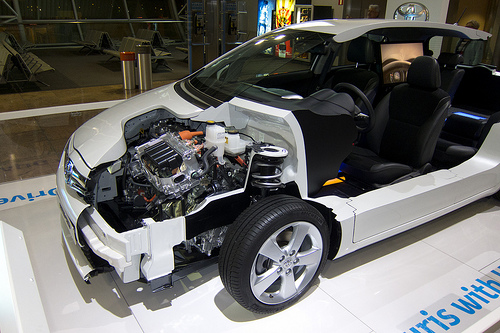Hybrid cars are the underdog that no one ever saw coming in terms of the massive popularity that they have enjoyed in recent years. Thanks to persistent “going green” campaigns, more consumers are seeing the sense in converting to hybrid automobiles due to the fact that they save them money on gas, and play a part in reducing the planet’s collective carbon footprint. In this article, UK-based company, PassSmart, take a look at the environmental benefits that a hybrid has, while examining the pros and cons of this kind of car.
The Case for Hybrid Cars
Lifetime Energy Cost – An Analysis
In 2007, marketing research think tank, CNW, rated all model cars sold in the USA two years back. Instead of using the standard mpg standard of measure, the report considered the energy used by each car, from its conception to the junkyard. It factored into each vehicle’s lifetime previously overlooked details such as:
The energy used to ferry the design engineers to and from work daily, create replacement tires and build car materials.
The energy that went into designing, manufacturing, assembling, transporting, selling, purchasing, driving, maintaining, repairing and, ultimately, scrapping a car.
These energy inputs were then quantified as a cost per mile driven over the car’s lifetime, but were ultimately expressed in dollars.
The results revealed that models like the Cadillac Escalade, Land Rover and the Hummer H3 used up less energy per lifetimes compared to any hybrid vehicle. This is surprising, given the common line of thought which states that hybrids use less energy. However, in terms of the miles per gallon measurement, a hybrid ultimately uses less gas, which contributes to short-term energy savings.
Technology
It seems that hybrids are energy efficient on the consumer end and have big environmental impact for manufacturers. For instance, the technology used in the electric battery makes hybrids fuel efficient, as they emit less greenhouse gases. However, this technology is relatively new which means battery production isn’t as streamlined as we would like it to be, compared to the internal combustion engine which is the staple for most cars.
Lifespan
Hybrids tend to have a lower lifespan. Take your average middle-range computer, for example. It seems sensible to throw away an old desktop to replace it with a new one, given the fact that repair costs may not make economic sense in the long run. However, regardless of lifespan, a hybrid won’t need regular servicing when compared to your average fuel-guzzler because they have fewer parts than conventional cars. This means that chances of these parts wearing out are less compared to conventional automobiles.
Fuel Efficiency
When deciding on whether to buy a hybrid car or not, you might want to examine the efficiency of these cars. Hybrids are more efficient than fuel cars. This is because electric motors can regenerate electricity when braking or going downhill. A hybrid can also charge itself when the fuelled engine is running, and regenerate during braking. This means that they do not pollute while sitting idly in traffic, as compared to conventional cars, and do not pollute at all when sitting in traffic.
Rising Oil Prices
A hybrid car is the perfect solution to the rising oil prices. The increase in consumption of fossil fuels and their worldwide demand has resulted in massive depletion of oil wells, with no guarantee of finding more oil sources. Using hybrid cars will help in cutting down our over-dependence on oil as a nation and harness other energy sources that are sustainable and renewable.
The final Word on Hybrids
Hybrids have been marketed as eco- friendly and, in terms of fuel efficiency, that’s largely true. However, when we’re talking sustainability, that’s a completely different story. It is the responsibility of every consumer to carry out exhaustive research to know which type of car to buy in terms of:
The updated information of the particular model in mind
Its cost-effectiveness
Its real-time performance on the road via the numerous road tests done
Hybrid cars are the most environmentally friendly cars around, and it’s certainly exciting to see what auto manufacturers are going to come up with next for the consumer that want to play a part in protecting the environment, while at the same time saving on fuel costs.
This guest post was brought to you by PassSmart.com; the quick and easy way to find a driving instructor in the UK.



Hybrid cars are alternative-fuel vehicles that are made to protect our environment and save our energy resources. But still it is not a preferred vehicle among people due to some issues. But you must see the advantages that weighs more that disadvantages. Anyways, thanks for the post!!!